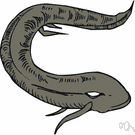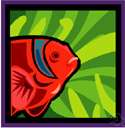vertebrate
(redirected from Vertebrate viruses)Also found in: Thesaurus, Medical, Encyclopedia.
ver·te·brate
(vûr′tə-brĭt, -brāt′)adj.
1. Having a backbone or spinal column.
2. Of or characteristic of vertebrates or a vertebrate.
n.
Any of numerous chordate animals of the subphylum Vertebrata, characterized by a segmented spinal column and a distinct well-differentiated head. The vertebrates include the fishes, amphibians, reptiles, birds, and mammals.
[Latin vertebrātus, having joints, from vertebra, vertebra; see vertebra.]
American Heritage® Dictionary of the English Language, Fifth Edition. Copyright © 2016 by Houghton Mifflin Harcourt Publishing Company. Published by Houghton Mifflin Harcourt Publishing Company. All rights reserved.
vertebrate
(ˈvɜːtɪˌbreɪt; -brɪt)n
(Zoology) any chordate animal of the subphylum Vertebrata, characterized by a bony or cartilaginous skeleton and a well-developed brain: the group contains fishes, amphibians, reptiles, birds, and mammals
adj
(Zoology) of, relating to, or belonging to the subphylum Vertebrata
Collins English Dictionary – Complete and Unabridged, 12th Edition 2014 © HarperCollins Publishers 1991, 1994, 1998, 2000, 2003, 2006, 2007, 2009, 2011, 2014
ver•te•brate
(ˈvɜr tə brɪt, -ˌbreɪt)adj.
1. having vertebrae; having a segmented backbone.
2. belonging or pertaining to the Vertebrata, a subphylum of chordate animals having an internal skeleton of bone or cartilage that includes a braincase and a spinal column, and comprising mammals, birds, reptiles, amphibians, and fishes.
n. 3. a vertebrate animal.
[1820–30; < Latin vertebrātus jointed]
Random House Kernerman Webster's College Dictionary, © 2010 K Dictionaries Ltd. Copyright 2005, 1997, 1991 by Random House, Inc. All rights reserved.
ver·te·brate
(vûr′tə-brĭt, vûr′tə-brāt′) Any of a large group of animals having a backbone, including fish, amphibians, reptiles, birds, and mammals. Vertebrates are bilaterally symmetrical and have an internal skeleton of bone or cartilage, a nervous system along the back that is divided into brain and spinal cord, and not more than two pairs of limbs.
The American Heritage® Student Science Dictionary, Second Edition. Copyright © 2014 by Houghton Mifflin Harcourt Publishing Company. Published by Houghton Mifflin Harcourt Publishing Company. All rights reserved.
vertebrate
An animal with a backbone, e.g. fish, reptile, mammal.
Dictionary of Unfamiliar Words by Diagram Group Copyright © 2008 by Diagram Visual Information Limited
ThesaurusAntonymsRelated WordsSynonymsLegend:
Switch to new thesaurus
| Noun | 1. |  vertebrate - animals having a bony or cartilaginous skeleton with a segmented spinal column and a large brain enclosed in a skull or cranium vertebrate - animals having a bony or cartilaginous skeleton with a segmented spinal column and a large brain enclosed in a skull or craniumfetus, foetus - an unborn or unhatched vertebrate in the later stages of development showing the main recognizable features of the mature animal chordate - any animal of the phylum Chordata having a notochord or spinal column Craniata, subphylum Craniata, subphylum Vertebrata, Vertebrata - fishes; amphibians; reptiles; birds; mammals Amniota - higher vertebrates (reptiles, birds and mammals) possessing an amnion during development amniote - any member of the Amniota aquatic vertebrate - animal living wholly or chiefly in or on water gnathostome - a vertebrate animal possessing true jaws bird - warm-blooded egg-laying vertebrates characterized by feathers and forelimbs modified as wings amphibian - cold-blooded vertebrate typically living on land but breeding in water; aquatic larvae undergo metamorphosis into adult form reptile, reptilian - any cold-blooded vertebrate of the class Reptilia including tortoises, turtles, snakes, lizards, alligators, crocodiles, and extinct forms mammal, mammalian - any warm-blooded vertebrate having the skin more or less covered with hair; young are born alive except for the small subclass of monotremes and nourished with milk tetrapod - a vertebrate animal having four feet or legs or leglike appendages belly - the underpart of the body of certain vertebrates such as snakes or fish tail - the posterior part of the body of a vertebrate especially when elongated and extending beyond the trunk or main part of the body caudal appendage - tail especially of a mammal posterior to and above the anus costa, rib - any of the 12 pairs of curved arches of bone extending from the spine to or toward the sternum in humans (and similar bones in most vertebrates) blood - the fluid (red in vertebrates) that is pumped through the body by the heart and contains plasma, blood cells, and platelets; "blood carries oxygen and nutrients to the tissues and carries away waste products"; "the ancients believed that blood was the seat of the emotions" ovary - (vertebrates) one of usually two organs that produce ova and secrete estrogen and progesterone chest, pectus, thorax - the part of the human torso between the neck and the diaphragm or the corresponding part in other vertebrates pedal extremity, vertebrate foot - the extremity of the limb in vertebrates endoskeleton - the internal skeleton; bony and cartilaginous structure (especially of vertebrates) |
| Adj. | 1. |  vertebrate - having a backbone or spinal column; "fishes and amphibians and reptiles and birds and mammals are verbetrate animals" vertebrate - having a backbone or spinal column; "fishes and amphibians and reptiles and birds and mammals are verbetrate animals"zoological science, zoology - the branch of biology that studies animals invertebrate, spineless - lacking a backbone or spinal column; "worms are an example of invertebrate animals" |
Based on WordNet 3.0, Farlex clipart collection. © 2003-2012 Princeton University, Farlex Inc.
Translations
فَقْري
vertebrat
obratlovec
hvirveldyr
selkärankainen
kralješnjak
gerinces
vertebratevertebrato
bertulang belakanghewan bertulang belakanghewan vertebratavertebrata
hryggdÿrhryggleysingjar
せきついせきついどうぶつ脊椎脊椎動物
stuburinis
gewerveldgewervelde
kręgowiec
vertebradovertebrada
stavovec
omurgalı
Collins Spanish Dictionary - Complete and Unabridged 8th Edition 2005 © William Collins Sons & Co. Ltd. 1971, 1988 © HarperCollins Publishers 1992, 1993, 1996, 1997, 2000, 2003, 2005
Collins English/French Electronic Resource. © HarperCollins Publishers 2005
vertebrate
adj brain, eye etc → von Wirbeltieren
Collins German Dictionary – Complete and Unabridged 7th Edition 2005. © William Collins Sons & Co. Ltd. 1980 © HarperCollins Publishers 1991, 1997, 1999, 2004, 2005, 2007
Collins Italian Dictionary 1st Edition © HarperCollins Publishers 1995
vertebra
(ˈvəːtibrə) – plural ˈvertebrae (-briː) – noun any of the bones of the spine. She has a broken vertebra.
ˈvertebrate (-brət) noun, adjective (an animal) having a backbone. Insects are not vertebrates.
Kernerman English Multilingual Dictionary © 2006-2013 K Dictionaries Ltd.
ver·te·brate
n. vertebrado, que posee columna vertebral o una estructura semejante.
English-Spanish Medical Dictionary © Farlex 2012
